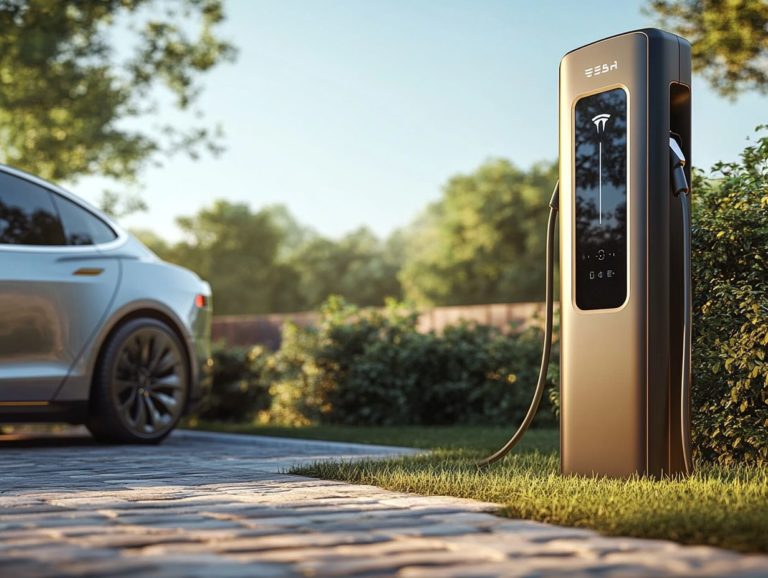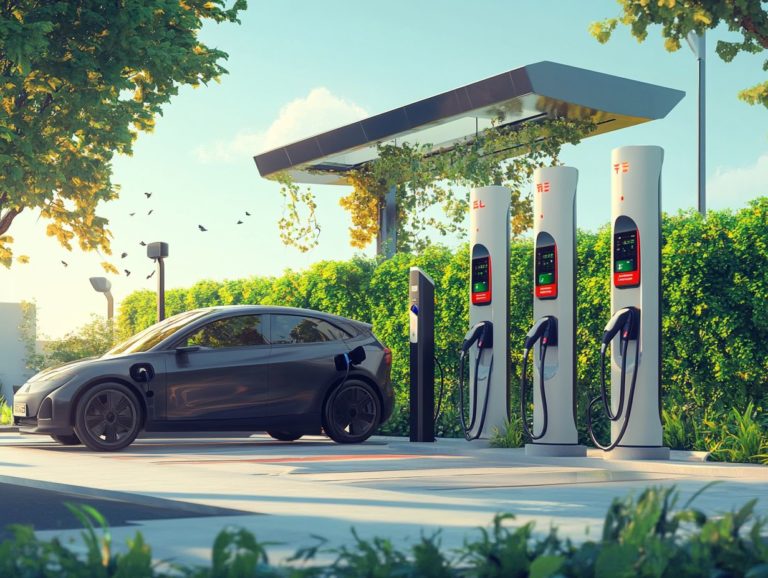How EV Charging Stations Are Funded
As electric vehicles (EVs) continue to soar in popularity, you re likely noticing a rapid rise in the demand for charging infrastructure.
Understanding the various funding sources for EV charging stations is essential for you if you re considering investing in this burgeoning market.
This article delves into the different types of charging stations available, along with government grants and private funding options that facilitate their development. We ll also touch on the economic and environmental benefits they contribute.
You ll explore the factors that shape funding dynamics while gaining valuable insights into future trends.
Join us on this exciting journey to explore the evolving landscape of EV charging station funding.
Contents
- Key Takeaways:
- Overview of EV Charging Stations
- Funding Sources for EV Charging Stations
- Costs and Benefits of EV Charging Stations
- Factors Affecting Funding for EV Charging Stations
- Future of EV Charging Station Funding
- Frequently Asked Questions
- What are the main sources of funding for EV charging stations?
- How do government grants and incentives work for funding EV charging stations?
- Are there any private companies or organizations that offer funding for EV charging stations?
- Do utility programs play a role in funding EV charging stations?
- Can individuals or businesses apply for funding for EV charging stations?
- Are there any financial benefits for installing EV charging stations?
Key Takeaways:

- Government grants and incentives play a crucial role in funding EV charging stations, as they provide financial support for development and installation.
- Private funding options, such as partnerships and investments, can also contribute to the funding of EV charging stations.
- The economic and environmental benefits of EV charging stations, as well as policy and regulation changes, are important factors that can influence funding for these stations.
Overview of EV Charging Stations
The growing shift toward electric vehicles (EVs) requires a robust expansion of EV charging stations, an essential element of the EV infrastructure. This expansion is bolstered by various federal funding initiatives, including the Bipartisan Infrastructure Law and the NEVI Formula Program.
These charging stations do more than just support the usage of low-emission vehicles; they are instrumental in improving air quality and advancing clean energy solutions in both urban and rural settings.
Types of Charging Stations
Charging stations for electric vehicles come in various types: Level 1 chargers, Level 2 chargers, and DC fast chargers. Each one is designed to cater to different user needs and charging speeds.
Grasping these charging options is crucial for you, whether you’re a current EV owner or considering making the switch. Level 1 chargers typically use a standard household outlet, providing the slowest charging speed but are perfect for overnight charging at home, allowing you to wake up to a fully powered vehicle.
On the other hand, Level 2 chargers use a 240-volt outlet and are faster than Level 1. They offer a speedier charge and are commonly found in public places, making them ideal for longer stops during your day. Then there are DC fast chargers, a type of charger that provides a quick energy boost to your electric vehicle. They can replenish your EV’s battery to about 80% in as little as 30 minutes, making them a great option for those long road trips.
By understanding these charging functionalities, you can optimize your charging experience based on your lifestyle and travel habits.
Funding Sources for EV Charging Stations
You’ll find that funding sources for EV charging stations are quite varied. They include federal funding opportunities created by legislation like the Bipartisan Infrastructure Law and the Inflation Reduction Act, both designed to accelerate the deployment of charging stations in EV ecosystems across the nation.
Government Grants and Incentives
Government grants and incentives are instrumental in financing EV infrastructure projects, with programs like the NEVI Formula Program and the Clean School Bus Program offering substantial financial backing to municipalities and organizations.
These initiatives not only pave the way for the installation of charging stations in diverse regions, but they also champion the shift toward cleaner transportation systems. For example, the IRS Electric Vehicle (EV) Charging Station Incentive allows you, as a business owner, to claim tax credits, encouraging your involvement in developing EV hubs.
State-specific grants often focus on underserved communities, ensuring equitable access to clean energy solutions. By promoting collaboration among local governments, private companies, and non-profits, these funding opportunities enhance urban mobility, reduce greenhouse gas emissions, and contribute to broader clean energy goals, ultimately bolstering community health and sustainability.
Private Funding Options

Alongside government support, private funding options like loans and community partnerships are crucial for advancing EV infrastructure.
These resources empower businesses and governments to create a strong network of charging stations for the growing number of electric vehicles.
Models such as public-private partnerships collaborations between government and private companies and crowdfunding initiatives are gaining momentum. They offer innovative solutions tailored to community needs.
Collaborations among automakers, energy companies, and real estate developers enhance the accessibility of charging points.
These alliances go beyond just bolstering infrastructure; they encourage greater adoption of electric vehicles by ensuring potential users feel confident about the availability of charging options.
Costs and Benefits of EV Charging Stations
The costs and benefits of EV charging stations involve multiple factors, including the initial investment required and ongoing operational expenses.
These stations also provide significant environmental benefits, playing a crucial role in promoting sustainable public transportation solutions.
Economic and Environmental Impact
The economic impact of EV charging stations is profound. They not only create jobs and stimulate local economies but also deliver significant environmental benefits.
By reducing greenhouse gas emissions and improving air quality, these initiatives advance clean energy alternatives.
The integration of charging infrastructure enhances public transportation systems, enabling greener commutes and encouraging a shift away from fossil fuels.
Local businesses benefit from increased foot traffic as customers stop to charge their vehicles, fostering community engagement and financial growth.
As more EV charging stations emerge, they pave the way for innovation and the development of sustainable technologies, crucial for addressing urban congestion and climate change.
Factors Affecting Funding for EV Charging Stations
Several factors influence the availability of funding for EV charging stations. Market demand plays a crucial role, along with the development of infrastructure.
Policy changes driven by significant legislation, including the Bipartisan Infrastructure Law and the Inflation Reduction Act, can significantly impact funding opportunities. Understanding these elements will empower you to navigate the landscape effectively.
Market Demand and Infrastructure Development
The market demand for electric vehicles directly shapes the pace of infrastructure development. This underscores the necessity for a comprehensive EV charging network to accommodate the growing number of EV users.
As more consumers choose electric vehicles, the urgency for a robust network of charging stations becomes clear. This trend reflects a shift in consumer preferences and compels the automotive industry to innovate.
Heightened adoption acts as a catalyst for investments from both government and private sectors in charging solutions.
Financial support is crucial to ensure communities have access to efficient and convenient charging points, fostering even greater adoption of electric vehicles.
Ultimately, this interconnected relationship between market demand and infrastructure development paves the way for a sustainable transition to cleaner transportation options.
Policy and Regulation Changes

Policy and regulation changes play a vital role in shaping the landscape for EV charging infrastructure. They often determine the flow of government funding and frameworks for implementation.
These shifts can significantly influence how resources are allocated. They prioritize projects that enhance the availability of charging stations across various regions.
When supportive legislation is enacted, it opens avenues for grants and subsidies and incentivizes private investments. This fosters a more robust market for electric vehicles.
Comprehensive policies can establish standards and guidelines that help streamline the deployment process. They ensure charging stations are strategically located to meet increasing demand.
A collaborative approach between the government and the private sector is essential to build a sustainable and accessible EV ecosystem.
Future of EV Charging Station Funding
Exciting developments are on the horizon for EV charging funding! The future appears bright, fueled by emerging trends and a growing dedication to government support.
You can anticipate a surge in community-based projects and innovative financing solutions designed to elevate EV infrastructure.
Embracing these developments will play a pivotal role in shaping a sustainable and accessible charging network for electric vehicles.
Trends and Predictions
Current trends reveal a significant upswing in funding for EV charging stations. Predictions indicate that government policies will continue to adapt to the growing electric vehicle market and its infrastructure demands.
As consumer demand for electric vehicles escalates, various market dynamics will shape the funding landscape. The collaboration between private enterprises and local governments is poised to ignite community initiatives.
These initiatives will not only enhance the availability of charging stations but also champion sustainable practices.
This multifaceted strategy is likely to yield a decentralized network (a system without a central point of control) of charging solutions. This ensures seamless accessibility and encourages broader adoption among consumers.
The synergy of government support and grassroots efforts will be vital in constructing a resilient EV infrastructure.
Frequently Asked Questions
What are the main sources of funding for EV charging stations?
The main sources of funding for EV charging stations include government grants and incentives, private investments, and utility programs, alongside insights from the future of EV charging stations.
How do government grants and incentives work for funding EV charging stations?

Government grants and incentives for EV charging stations are typically awarded to businesses and organizations to cover a portion of the costs associated with installation and operation.
Are there any private companies or organizations that offer funding for EV charging stations?
Yes, there are private companies and organizations that offer funding for EV charging stations. This can be through direct investments or partnerships with other companies.
Do utility programs play a role in funding EV charging stations?
Yes, many utility companies offer programs specifically designed to fund the installation and maintenance of EV charging stations. They often collaborate with government agencies and private companies.
Can individuals or businesses apply for funding for EV charging stations?
Individuals or businesses can apply for funding for EV charging stations. However, the eligibility criteria and application process may vary depending on the funding source.
Are there any financial benefits for installing EV charging stations?
Yes, there are potential financial benefits for installing EV charging stations. These include tax incentives, increased property value, and potential revenue from usage fees.
Explore your options today to be part of the EV revolution!





